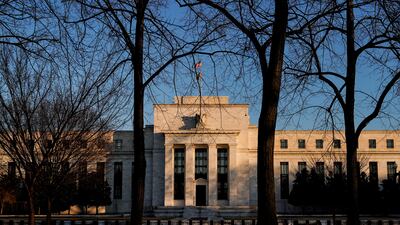Rising tension in the Middle East poses a greater near-term risk to the US financial system than persistent inflation and high interest rates, a survey released on Friday by the Federal Reserve showed.
According to the Fed's financial stability report, 46 per cent of contacts cited Middle East tension as a salient risk to the financial system, compared to 33 per cent for inflation and monetary tightening.
The financial stability report is a biannual survey released by the Fed to assess the resilience of the US financial system. Friday's report showed a 14 per cent increase in those who considered Middle East tension to be a risk. Those who viewed inflation as a risk, meanwhile, fell from 72 per cent to 33 per cent.
Fiscal debt sustainability topped the potential risks to the financial system, with 54 per cent of respondents considering it a near-term risk.
“Respondents noted the most immediate risk in Middle East tensions would be a widening of the conflict within the region, with some highlighting a tail risk that it could become a global conflict,” the report said.
The survey said the main channels affecting financial stability would be disruptions to energy supplies and broader commodity markets.
Geopolitical risks have often featured in the rate-setting Federal Open Market Committee's discussions since the onsets of the war in Ukraine in 2022 and in the Middle East last year, according to minutes released by the central bank.
“Further escalation of geopolitical tensions could reduce economic activity, boost inflation, and heighten volatility in global financial markets,” the report said.
The report added that a combination of high asset valuation pressures, along with rising geopolitical and policy uncertainty, “increases the risk of a sudden pullback from risk-taking”. Such a scenario could lower asset prices, leaving US businesses and investors exposed to risks.
Fed Chair Jerome Powell pointed to elevated geopolitical risks as potential “black clouds” that the central bank is watching with respect to the economic outlook. While he noted the conflicts have had little impact on the economy so far, he said this could change depending on things such as oil prices.
The price of oil has been relatively stable after spiking earlier this year. The price of Brent crude oil closed Friday at $71.20 per barrel on Friday while West Texas Intermediate crude oil was at $71.16 per barrel.
Meanwhile, the US economy keeps humming. Backed by robust consumer spending, the nation's economy grew by 2.8 per cent last quarter. At the same time, the unemployment rate remains a low 4.1 per cent while inflation ticks closer down to the Fed's 2 per cent goal.
Those developments have brought increased expectations that the economy can achieve a soft-landing scenario. The Fed, which has lowered interest rates by 75 basis points since September, will determine in December if it needs to reduce policy again.
The positive inflation outlook was reflected in Friday's survey.
The number of those who believed persistent inflation and monetary tightening fell by 59 per cent. At the same time, 38 per cent consider a recession to remain a risk, pointing to some uncertainty in the outlook.
Respondents were also increasingly concerned about the potential of a global trade war, “noting the potential for tariff barriers to prompt retaliatory protectionist policies that would negatively affect global trade flows and put renewed upwards pressure on inflation”.
Those concerns have spilt over into the Treasury market, with yields on the 10-year Treasury rising despite the Fed's rate cuts.
The report found that asset valuation pressures remain elevated, while vulnerabilities from household and business debt is moderated. Still, the Fed noted delinquencies on credit cards and auto loans are above pre-pandemic loans.
Meanwhile, the banking system remains resilient and funding risks remain "notable" despite decreasing somewhat.


